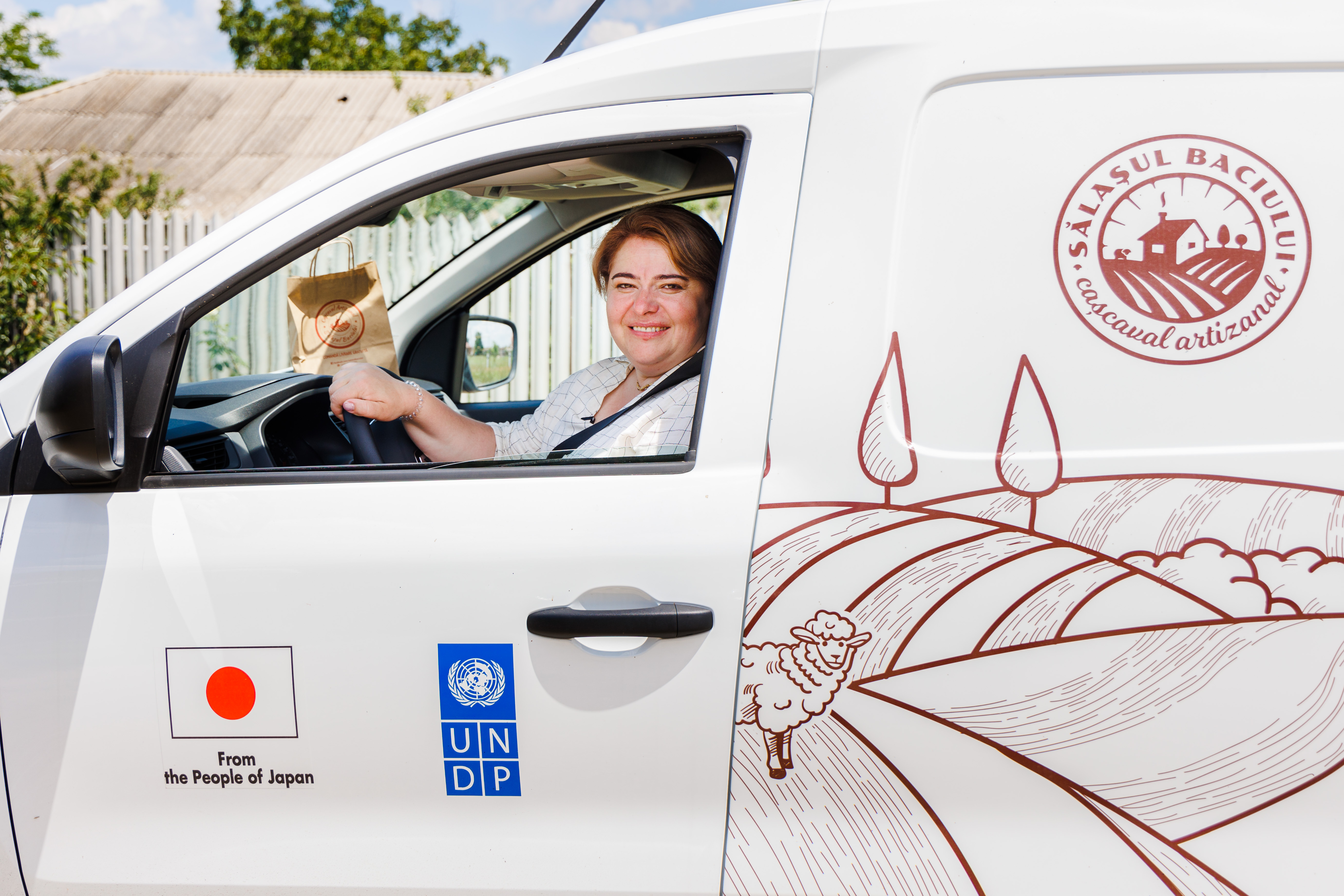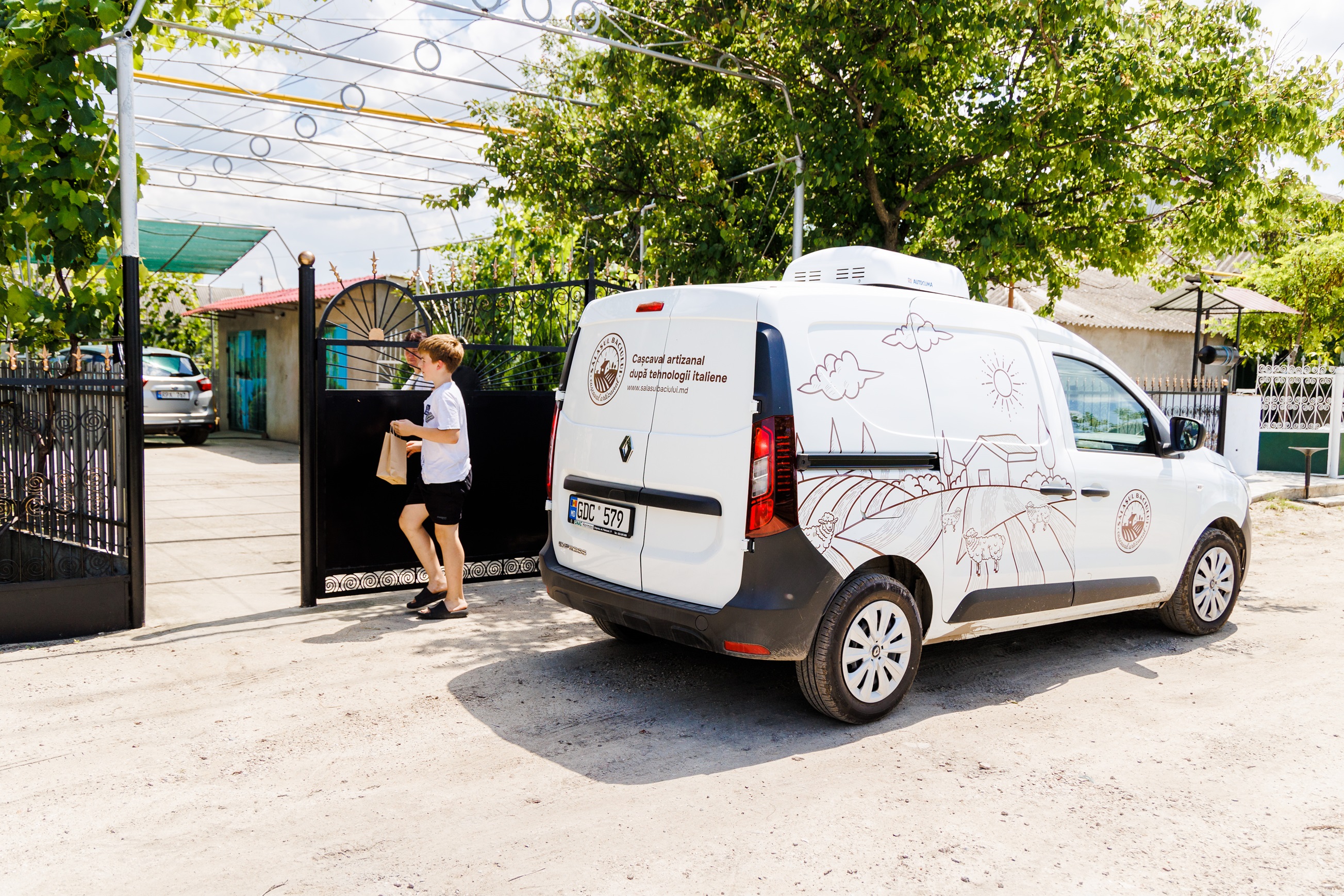“May the aged cheese be with you!” - the evolution of the artisan cheese market in Moldova and the enthusiasts behind it
May 30, 2024

Dorina Baciu manages the "Sălașul Baciului" mini-factory in the village of Sadaclia, Basarabeasca district, a business founded together with her husband, Valeriu Motroi. They are the only local artisans who produce aged cheese with a maturation period of up to 50 months, following Italian technologies.
“I started to love aged cheese when I lived in Italy. During that time, in Moldova, my father purchased 100 sheep, hoping that me and my husband would return home and take care of them. I couldn't imagine what it would be like to produce aged cheese in Moldova. For centuries, traditional cheese was more popular: sheep cheese, goat cheese... there was no culture of consuming locally produced aged cheese. Even now, I think we are about 10 years away from this product being consumed in quantities that would encourage producers to embark on this journey. That's why there are so few of us in the artisanal aged cheese industry,” says Dorina.
Dorina and her husband, who were from the same village, spent a significant amount of time working in Italy - he for 13 years and she for 10 years, during which Dorina tried many jobs: at the local dairy factory, in construction, and even as a driver, while pregnant.
“When I was little, I wanted to escape the village as soon as possible and have nothing to do with animals and milk. I had graduated from the Faculty of Law and was looking for opportunities outside the country. But life has its mysterious ways and now I am back, working with milk, while my law degree helped me along the way to write official letters, contracts, defend my rights and promote legal initiatives in favor of small producers,” notes Dorina.
Although they only come back home for two weeks each year, the idea of returning permanently and launching a business was always on their minds. This desire and the longing for home eventually won and led the spouses to return in 2015 and launch their business in 2017. During the last year spent in Italy, Dorina and Valeriu visited small villages in the Sicilian mountains to study the technology and gain experience in the field of artisanal products.
The entrepreneurs started with traditional cheese and later switched to the aged one, becoming some of the pioneers of artisan aged cheese production in Moldova. Because the product was new to the public, the family gave away free samples, sold products for symbolic prices and monitored how the buyers and the market reacted.
Eventually, they had to give up the 100 sheep as it was complicated to take care of them and manage the business at the same time.
Since 2018, Dorina and her family started selling at Eco-local, a fair of eco and artisanal products, organized every Saturday in Chișinău. People liked the cheeses and sometimes, even with four sellers at the table, they couldn't keep up with the demand. Since then, the range was completed with other types of aged cheese, but the producers still use the original technology and quality raw milk.
“We were once visited by a delegation that included an Italian technologist. He tasted our products and said that even in their country, in many mountain regions, this recipe has not been preserved. He expressed his admiration and wished us success. Experiences like this give us the strength to move forward,” recalls Dorina.
In the high season, around 200 litres of milk per day are processed, the most intense months being May, June and July. The cheese is possessive and time-consuming, and the family does not get much sleep as it works practically 24 hours a day, a processing cycle taking 12 hours.
Dorina and her husband do not plan to expand the business too much, as they want to run it as a family business and keep the product artisanal. There is demand on the Romanian market for her products and the producers are open to export options. They have also tried to collaborate with supermarket chains in Moldova but were told that foreign products are more popular than local ones, and if they have the same price, the buyer will most probably choose the imported product.
“Running this kind of business isn't for everyone. It takes a lot of hard work and dedication, and there are always unexpected hurdles to overcome. While it can be rewarding, the financial gains alone are not worth the effort. We've been growing steadily, but the pandemic and war in Ukraine slowed us down, we lost business from restaurants that closed,” emphasizes Dorina.
These challenges, however, were followed by the first non-reimbursable support from which the Baciu-Motroi family business benefited. “Another more suitable moment was not even possible,” remembers Dorina, who did not really believe that their project proposal could win a competition and they could benefit from financial support without giving anything in return.
The family business received funds from UNDP and Japan to procure a special car for collecting, transporting and storing milk and cheese.


Dorina and her husband do not plan to expand the business too much, as they want to run it as a family business and keep the product artisanal. There is demand on the Romanian market for her products and the producers are open to export options. They have also tried to collaborate with supermarket chains in Moldova but were told that foreign products are more popular than local ones, and if they have the same price, the buyer will most probably choose the imported product.
“Running this kind of business isn't for everyone. It takes a lot of hard work and dedication, and there are always unexpected hurdles to overcome. While it can be rewarding, the financial gains alone are not worth the effort. We've been growing steadily, but the pandemic and war in Ukraine slowed us down, we lost business from restaurants that closed,” emphasizes Dorina.
These challenges, however, were followed by the first non-reimbursable support from which the Baciu-Motroi family business benefited. “Another more suitable moment was not even possible,” remembers Dorina, who did not really believe that their project proposal could win a competition and they could benefit from financial support without giving anything in return.
The family business received funds from UNDP and Japan to procure a special car for collecting, transporting and storing milk and cheese.
"The purchase of a delivery machine has become a pressing necessity for the development of the business for some time. Customers will be able to receive our products more quickly, delivered fresh, respecting all hygiene and quality standards. It is also a great relief for our team, as previous deliveries required a lot of logistical organization and effort that we can now redirect to other production processes," says Dorina Baciu.
Dorina recently was elected co-president of the livestock microcluster "Cimișlia-Basarabeasca", founded in 2023 with support of the UNDP project "Resilient and inclusive markets in Moldova", funded by Switzerland. Although she was initially skeptical about collaborating with other producers and milk processors in the area, after many meetings and study visits organized to model farms throughout the country, she admitted that there is a huge potential for collaboration and development in this field.

“Now I feel that the future will be generous with the livestock sector and artisanal dairy products, it was about time we give it the attention it deserves. Within our cluster, we also plan to exchange experiences and form partnerships with entrepreneurs from all over the country and with another livestock cluster supported by UNDP - ‘Bacii Sudului’ from Cahul. They started this journey earlier and can help us avoid certain mistakes,” explains Dorina.
Entrepreneurs from the livestock cluster "Cimișlia-Basarabeasca" will benefit with UNDP and Switzerland support from equipment for milk processing and storage of dairy products. The animal gene pool in sheep and goat farms will also be improved by purchasing more productive animal breeds and the conditions for animal maintenance and feeding will be improved. The launch of a feed production plant is also planned, as well as the testing of ecological fertilization using animal manure.
Study visits to Romania organized by the project also opened new perspectives for the farmers and dairy producers, especially considering the process of EU integration and that products need careful review to access the European market.
“I do not regret returning home. I always felt like a stranger elsewhere... as the saying goes - ‘A guest is welcome for 3 days’. Although we have a lot of work to do, I am happy with the life here, and everything I can offer my children: sports, foreign languages courses… I would not be able to afford these in Italy. I don't know if they will want to continue this business, we will respect their decision, just as my parents respected my wish to graduate from law school and leave the country, without suspecting that I will return here and eventually fall in love with this industry,” concludes entrepreneur Dorina Baciu.

 Locations
Locations











